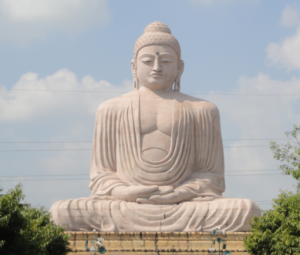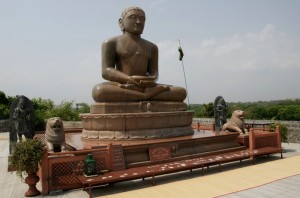Buddhism:
Buddhism is the middle way of wisdom and compassion. It stands for three pillars: a) Buddha – its founder; b) Dhamma – his teachings and c) Sangha – order of Buddhist monks and nuns.
Five Great Events of Buddha’s Life and their Symbols:
- Birth – Lotus and bull
- Great renunciation – Horse
- Nirvana – Bodhi tree
- First Sermon – Dharmachakra or wheel
- Parinirvana or death – Stupa
About Budha:

- Also known as Sakyamuni (the Sage of the Sakyas), Jina (the Victorious) or Tathagata (one who has reached the truth).
- Born in 563 B.C. on the Vaishakha Poornima Day at Lumbini (near Kapilavastu) in Nepal.
- His father Suddhodana was the Saka ruler.
- His mother was Mahamaya but he was brought up by his stepmother Gautami.
- Buddha was married at 16 to Yashodhara and enjoyed married life for 13 years and had a son named Rahula.
- After seeing an old man, a sick man, a corpse and an ascetic, he decided to become a wanderer.
- First guru was Alarakalama, next was Udraka Ramputra. He later joined five ascetics- Kandana, Vappa, Bhadiya, Mohanama and Assagi.
- Attained Nirvana at Gaya, age 35.
- Delivered the fi rst sermon at Sarnath at Deer Parkwhere his five disciples had settled. His first sermon is called ‘Dharmachakrapravartan’ or ‘Turning of the Wheel of Law’.
- Attained Mahapurinirvana at Kushinagar(U.P).
Eight Fold Path:
- Right Faith
- Right Thought
- Right Action
- Right Livelihood
- Right Effort
- Right Speech
- Right Remembrance
- Right Concentration
Jainism:
- Jainism was founded by Rishabhanath, the first Tirthankara.
- There were 24 Tirthankara (Prophets or Gurus) and all of them were Kshatriyas. Rishabhanath’s
- reference is also there in the Rigveda. But there is no historical basis for the fi rst 22 Tirthankaras. Onlythe last two are historical personalities.
- The 23rd TirthankaraParshwanath (symbol: snake) was the son of King Ashvasena of Benaras. His
- main teachings were: Non-injury, Non-lying, Nonstealing, Non-possession.
- The 24th and the last Tirthankara was Vardhman Mahavira (symbol: lion). He added celibacy to his main teachings.
About Vardhman Mahavira:

- He was born in Kundagram (district Muzaffarpur, Bihar) in 599 B.C.
- His father Siddhartha was the head of Jnatrika clan.His mother was Trishla, sister of Lichchhavi PrinceChetak of Vaishali.
- Mahavira was related to Bimbisara.
- Married to Yashoda and had a daughter named
- Priyadarsena, whose husband Jamali became hisfi rst discipline.
- In the 13th year of his asceticism, outside the townof Jrimbhikgrama, he attained supreme knowledge
- At the age of 72, he attained death at Pava, nearPatna in 527 B.C.
Division in Jainism:
1) Bhadrabhan( Rule of Nudity)——Digambaras
2) Sthulbhadra( Wear a white garment)—–Svetambaras
Teachings of Mahavira:
- Rejected the authority of Vedas and sacrifice.
- Refused to deny the importance of God. God was placed lower than Jina.
- Three ratnas are given: 1) Right Faith 2) Right Knowledge 3) Right Conduct.
AffairsCloud Recommends Oliveboard Mock Test
AffairsCloud Ebook - Support Us to Grow
Govt Jobs by Category
Bank Jobs Notification





